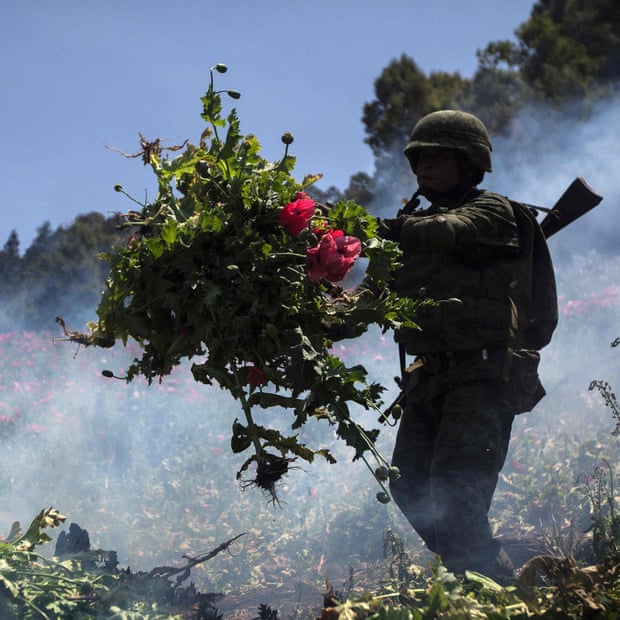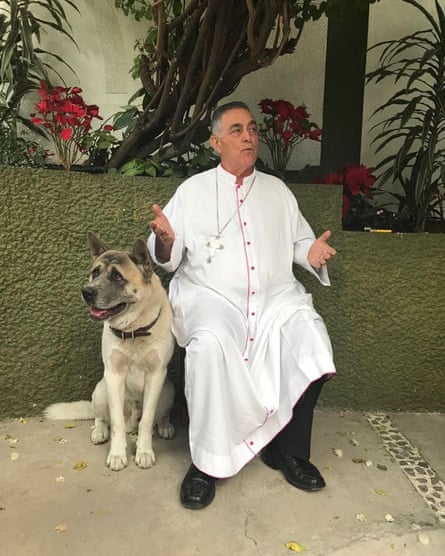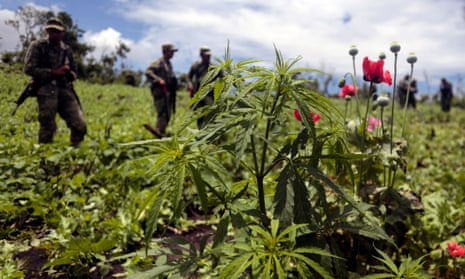The bishop Salvador Rangel Mendoza ministers to one of the toughest dioceses in Mexico: Chilpancingo-Chilapa lies in the country’s heroin-producing heartland, the setting for fierce battles between rival crime groups and security forces.
Violence in this part of the rugged state of Guerrero has reached such levels that entire villages have fled en masse and local morgues have run out of space to take more dead bodies.
But amid the bloodletting, the bishop has quietly worked on a radical solution: dialogue with cartel bosses.
“I am not reproaching their conduct,” he said. “Just to be allowed to talk with them and be able to resolve a very small problem – even if it is tiny – is important to me.”
Rangel has brokered prisoner exchanges between rival groups and even negotiated the release of kidnap victims, by speaking regularly to faction leaders, who he says – for all their brutality – “still respect their priests”.
“I can talk with them,” said Rangel, although he allowed that with at least eight separate organized crime groups in the diocese, his pleas for peace aren’t always heeded.
“They have told me: ‘we’re narcotics traffickers, not hitmen,’” he said. “One day I told them ‘perhaps try killing less,’ and they told me ‘when it’s not necessary.’”
Quick GuideMexico's war on drugs
Show

Why did Mexico launch its war on drugs?
On 10 December 2006, Felipe Calderón launched Mexico’s war on drugs by sending 6,500 troops into his home state of Michoacán, where rival cartels were engaged in tit-for-tat massacres.
Calderón declared war eight days after taking power – a move widely seen as an attempt to boost his own legitimacy after a bitterly contested election victory. Within two months, around 20,000 troops were involved in operations.
What has the war cost so far?
The US has donated at least $1.5bn through the Merida Initiative since 2008, while Mexico spent at least $54bn on security and defence between 2007 and 2016. Critics say that this influx of cash has helped create an opaque security industry open to corruption.
But the biggest costs have been human: since 2007, over 250,000 people have been murdered, more than 40,000 reported as disappeared and 26,000 unidentified bodies in morgues across the country. Human rights groups have also detailed a vast rise in human rights abuses including torture, extrajudicial killings and forced disappearances by state security forces.
Peña Nieto claimed to have killed or detained 110 of 122 of his government's most wanted narcos. But his biggest victory – and most embarrassing blunder – was the recapture, escape, another recapture and extradition of Joaquín “El Chapo” Guzmán, leader of the Sinaloa cartel.
Mexico’s decade-long war on drugs would never have been possible without the injection of American cash and military cooperation under the Merida Initiative. The funds have continued to flow despite indisputable evidence of human rights violations.
Under new president Andrés Manuel López Obrador, murder rates are up and a new security force, the Civil Guard, is being deployed onto the streets despite campaign promises to end the drug war.
What has been achieved?
Improved collaboration between the US and Mexico has resulted in numerous high-profile arrests and drug busts. Officials say 25 of the 37 drug traffickers on Calderón’s most-wanted list have been jailed, extradited to the US or killed, although not all of these actions have been independently corroborated.
The biggest victory – and most embarrassing blunder – under Peña Nieto’s leadership was the recapture, escape and another recapture of Joaquín “El Chapo” Guzmán, leader of the Sinaloa cartel.
While the crackdown and capture of kingpins has won praise from the media and US, it has done little to reduce the violence.
Last year, Mexico registered its most murderous year on record, and the violence has struck especially hard in Guerrero state, where cartels dispute territories for planting opium poppies, processing the opium gum and transporting it to the United States.
Even in this staunchly Catholic country, not even the church has been spared: at last six priests have been murdered in Guerrero since 2009, including two who were ambushed as they returned from Candlemas celebrations.

“I’m really much more afraid of the government than the [criminal] groups,” said Rangel.
“I’ve asked for help from some politicians, and they said, ‘We can’t get involved,” he recalled. “It’s because they’re sponsored by one of these groups and they don’t want to risk the deal.”
But Rangel offers no apologies for his approach to such a complicated region.
“When we perform our pastoral work, we are left with no choice but to move among them [the narcos],” he said. “If Guerrero is in the hands of narcotics traffickers and all those people work for them, when you do apostolic work, it is among them.”
A Franciscan friar, Rangel arrive in Chilpancingo in 2015, shortly after 43 college students disappeared after they were attacked by police and gang members.
He started travelling to remote villages and first spoke with a cartel boss after one of his priests received a death threat for denouncing the illegal drugs business.
His trips into the remote mountains have made him sympathetic to the plight of the campesinos who grow opium poppies, and a staunch opponent of the forced eradication of drug crops, which he says has left entire communities destitute.
“When will poppy production stop? When people are offered some other option,” Rangel said.
Rangel’s efforts have captured national attention, especially as Mexico’s clergy has mostly stayed silent on violence and corruption, and few politicians have offered alternative to the country’s current militarized counternarcotics strategy.
Andrés Manuel López Obrador, the current frontrunner for the 1 July presidential election, provoked outrage in December when he proposed an amnesty for those in the illegal drugs business.
Critics contend the bishops’ attempts at dialogue are unviable as there is no single leader to impose order on the battling cartels.
Victims’ families also express misgivings.
“They see his proposals badly,” said Manuel Olivera, a human rights activist in Chilapa. “They feel like he’s striking deals with those that are responsible for killing, disappearing or kidnapping their loved ones.”
But Rangel is painfully aware of the stakes: last week a congregation of nuns withdrew from the city of Chilapa after the parents of one of the sisters were kidnapped and killed.
“I know that people are afraid, even I’m afraid,” Rangel said at Sunday mass, where announced news of the nun’s slain family. He insists, however, that the path to peace involves speaking with the crime bosses.
“I am not reproaching their conduct,” Rangel said. “Just to be allowed to talk with them and be able to resolve a very small problem – even if it is tiny – is important.”

Comments (…)
Sign in or create your Guardian account to join the discussion